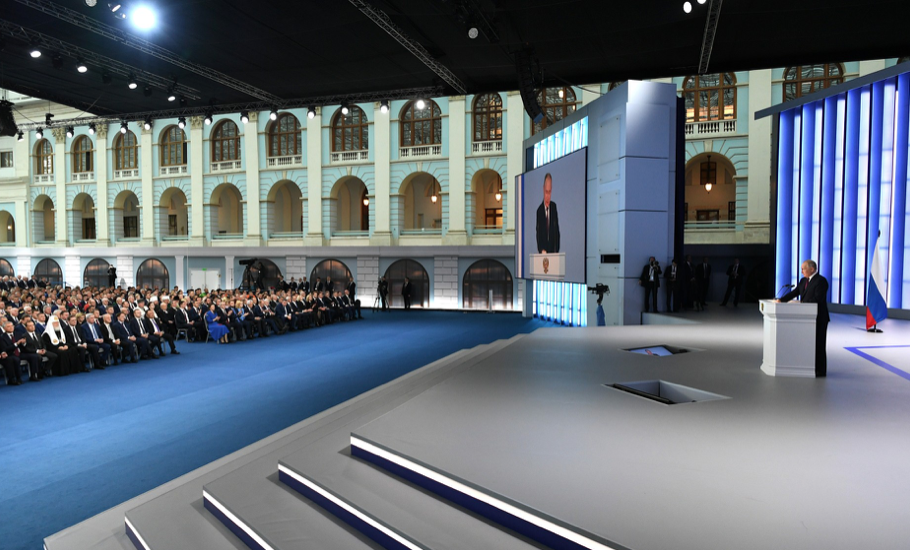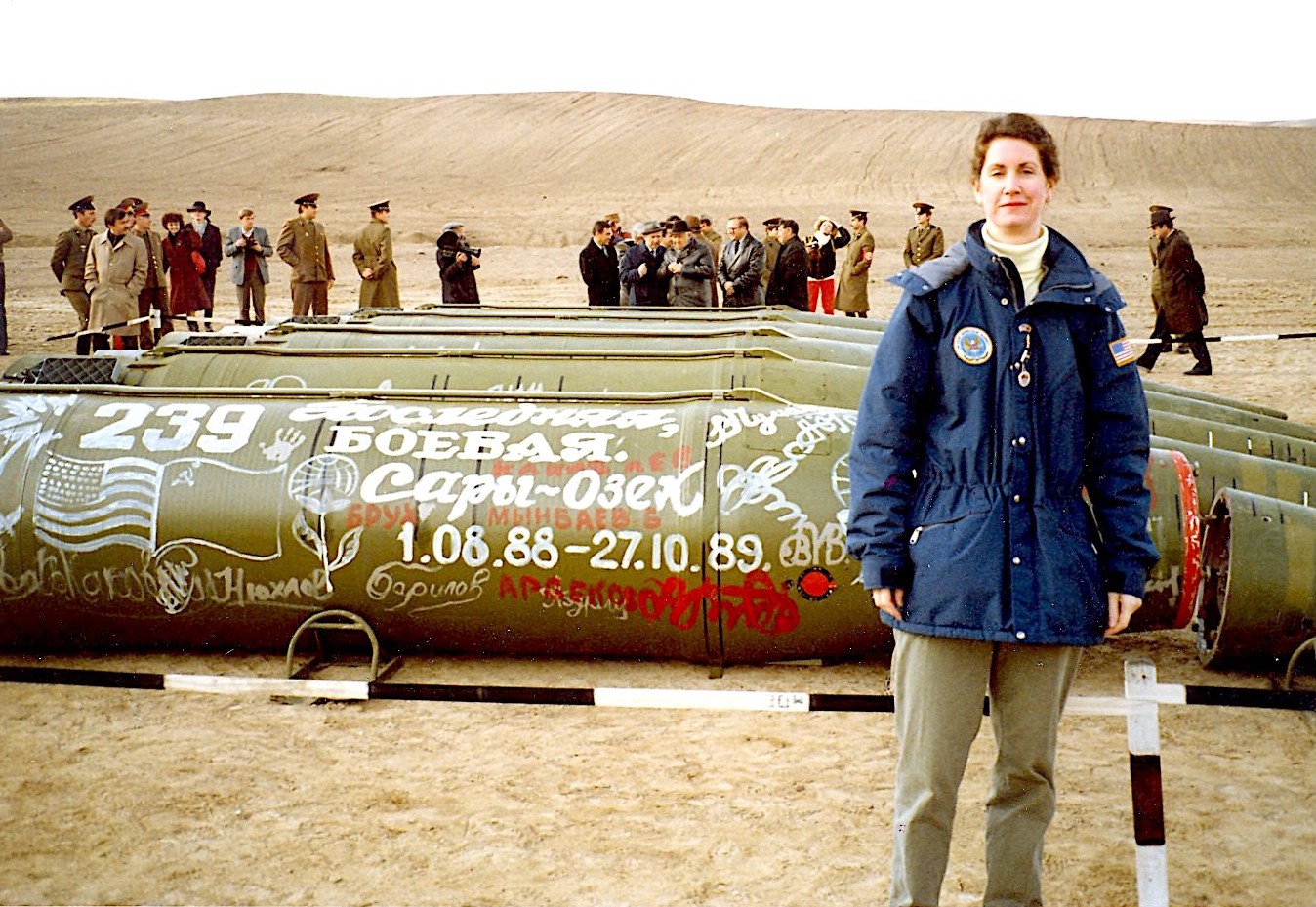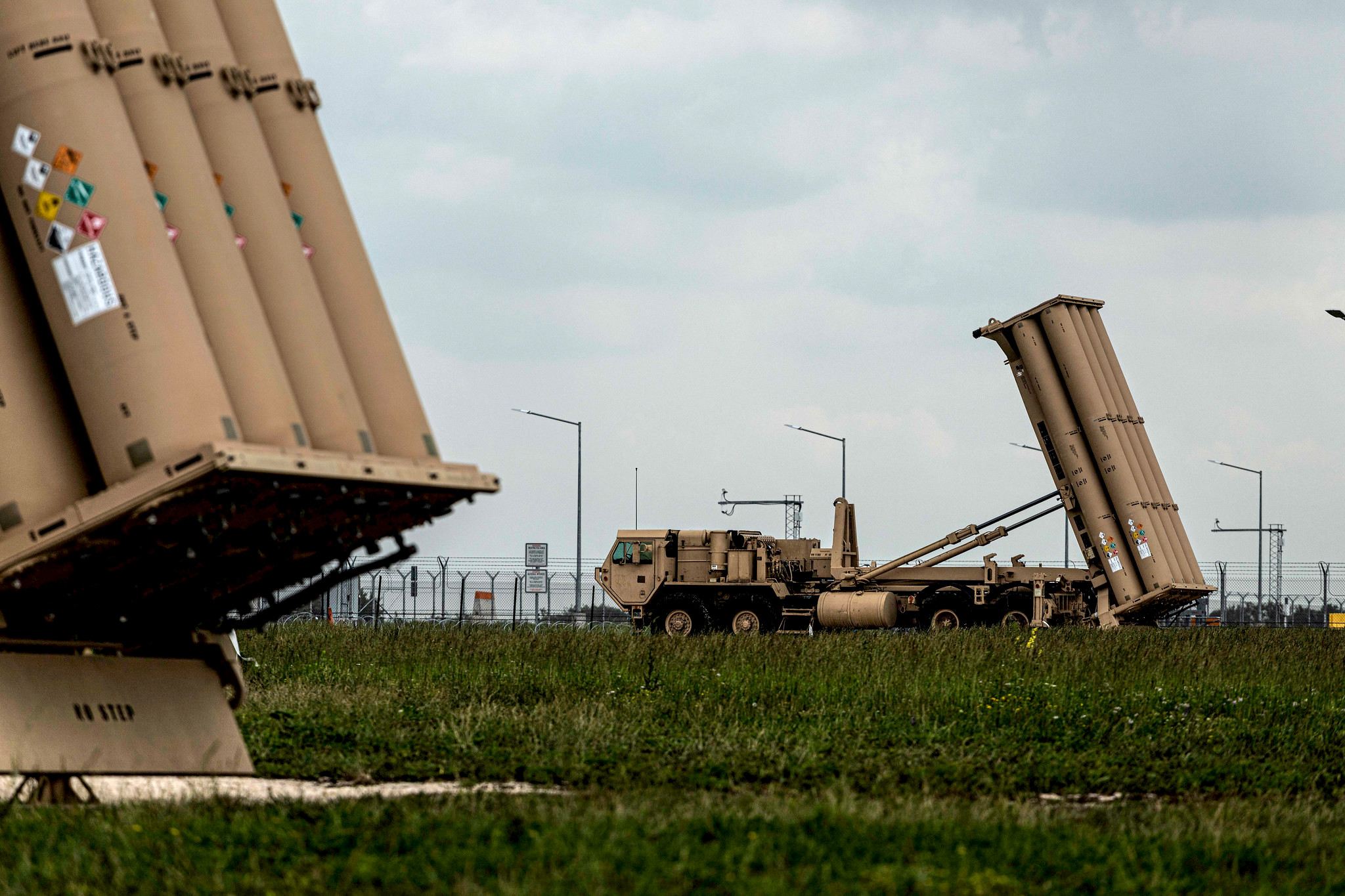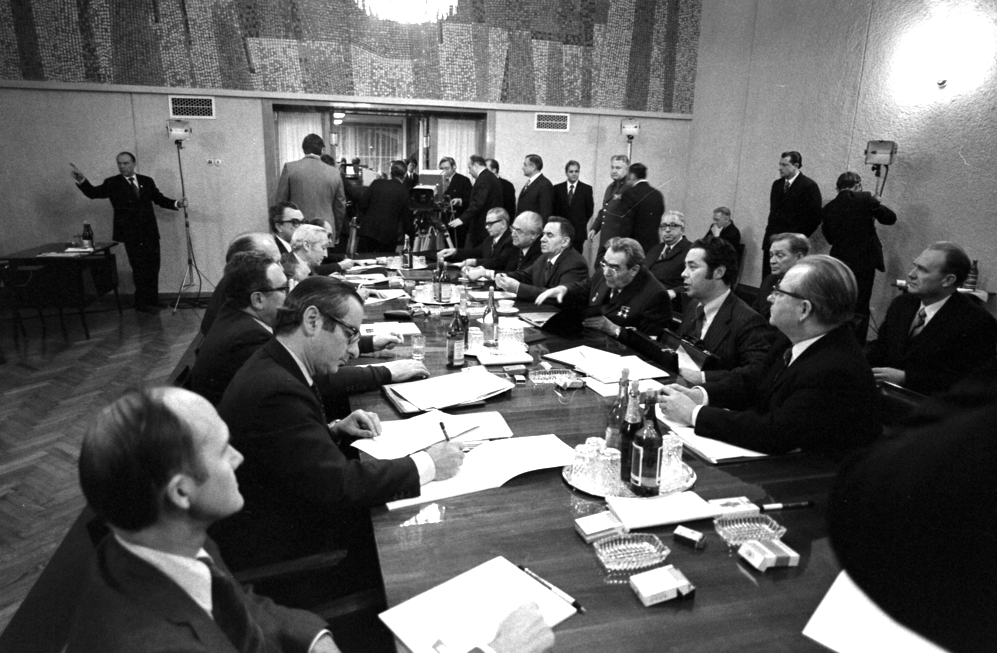Having used arms control to gain unilateral advantage over Russia, the cost to the U.S. and NATO in getting Moscow back to the negotiating table will be high.

Checking out the rise and fall of nuclear warheads over the years of the nuclear arms race at the Minuteman Missile National Historic Site in South Dakota, 2017. (Wayne Hsieh, Flickr, CC BY-NC 2.0)
By Scott Ritter
Special to Consortium News
 U.S.-Russian arms control is in a state of extreme distress.
U.S.-Russian arms control is in a state of extreme distress.
The U.S. withdrawal from the foundational Anti-Ballistic Missile (ABM) treaty in 2002 undid the functional and theoretical premise of mutually assured destruction (MAD) that provided logical equilibrium to the fundamentals of nuclear deterrence theory.
Similarly, the Trump administration’s precipitous termination of the Intermediate Nuclear Forces (INF) treaty in 2019 attacked both elements of the “trust but verify” maxim that governed issues of compliance verification that made arms control viable in the first place.
The last remaining arms control agreement that places limits on the strategic nuclear arsenals of both the U.S. and Russia is the New Strategic Arms Reduction Treaty (START).
Signed in 2010, and extended for five years in 2021, the treaty will expire in 2026. It places restrictions on the number of deployed nuclear warheads each side is permitted to have (1,550), as well as vehicles (missiles, bombers, submarines) to deliver these warheads (700).
Equally important to the numerical caps is the compliance verification regime mandated by the treaty, which includes the right of each side to conduct up to 18 on-site inspections per year. Up to 10 of these inspections can be done at operational bases where nuclear delivery systems are based. Inspectors there can visually confirm the presence of nuclear warheads by randomly selecting missiles for inspection.
On Hold

Russian President Vladimir Putin’s Feb. 21, 2023, address to Federal Assembly. (President of Russia)
The compliance verification aspects of New START have been on pause since early 2020, when public health concerns generated by the Covid-19 pandemic compelled both countries to cease inspections and the bi-annual convening of the Bilateral Consultative Committee (BCC) which oversaw the handling of any treaty discrepancies identified by either party.
When the pandemic began to wane in early 2022, efforts to restart treaty compliance verification and consultations were stymied by the political fallout from the Russian invasion of Ukraine. European Union sanctions banning overflights of Russian aircraft prevented Russia from carrying out on-site inspections of U.S. strategic nuclear facilities.
Issues of reciprocity drove Russia to deny U.S. inspectors access to Russian strategic facilities. And the BCC process was put on hold due to Russia’s concerns over the publicly-stated U.S. policy objective of achieving Russia’s “strategic defeat” in Ukraine.
The Russian posture became official policy when, at the end of his Feb. 21 address to the Russian Federal Assembly, Russian President Vladimir Putin announced that: “Russia is halting, putting a stop on its participation in the strategic weapons control agreement. I would like to reiterate, we are not exiting the agreement. We are putting a hold on it.”
His reasons mirrored previous Russian statements regarding U.S. behavior. “We know,” Putin said, “that the West is directly linked to the attempts of [the] Kyiv regime to attack our strategic aviation basis. The NATO specialist helped in directing unmanned aircraft to attack these facilities. And they want to inspect our facilities? Today this is just nonsense.”
Putin again laid out his concerns regarding the official U.S. and NATO stance towards Russia:
“I’d like to emphasize that [the] U.S. and NATO are directly stating that their objective is to strategically defeat Russia. And after that, are they thinking that they’re going to just tour our facilities, military facilities? Recently, we’ve passed a law to put the new strategic defense facilities in areas [sic]. Are they going to visit those as well?”
The answer, it seems, is “no.”
The Future of Arms Control

Eileen Malloy, chief of the arms control unit at the U.S. embassy in Moscow, in Saryozek, Kazakhstan in May 1990, where, under the INF Treaty, the last Soviet short-range missiles were destroyed. (American Foreign Service Association, U.S. State Department)
Where does this leave U.S.-Russian arms control? Dormant, but not yet dead. Resuscitating it, however, will require effort on the part of the U.S. and its NATO allies. Having made the choice to use arms control as a vehicle for gaining unilateral advantage over Russia, the cost for getting Russia back to the negotiating table will be high.
There are four primary issues that any future arms control agreement must, from the Russian perspective, address: missile defense; inclusion of U.K. and French nuclear forces; resurrection of the INF treaty and additional verification measures designed to signify good faith on the part of U.S. negotiators.
Missile defense was supposed to be part and parcel of the 2010 New START negotiations. The Obama administration convinced then-Russian President Dmitry Medvedev that strategic nuclear forces and missile defense must be treated as separate issues, and that the U.S. would in good faith seek to address Russian concerns once New START was ratified.
The U.S. lied by installing defensive missiles, with offensive capabilities, in Romania and Poland. The end result is that Russia has become locked into a treaty arrangement that sought to limit its nuclear deterrence forces at the same time as the U.S. was installing missile-killing technology on Russia’s borders.

A battery of THADD, or terminal high altitude area defense, for intercepting ballistic missiles, at U.S. naval facility in Deveselu, Romania, June 2019. (NATO)
Any future arms control agreement must address Russian concerns regarding missile defense if it is to have any hope of seeing the light of day.
In his address, Putin declared that, “Before we come back to the discussion of this [New START], we need to understand what France and the U.K. are trying to do and how we are going to take into account their strategic arsenals.”
From the very inception of negotiations on the reduction of U.S. and Soviet (and later, Russian) stockpiles, Russia has tried to include the British and French nuclear arsenals into the mix. The U.S. has steadfastly refused. Linking U.S. and NATO objectives to Russia’s “strategic defeat” has made it impossible for Russia to consider any future arms control discussion that does not include the nuclear weapons of these two NATO stalwarts in the overall equation.
Regaining Trust – A Tall Order
Moscow continues to view the U.S. withdrawal from the INF treaty as one of the greatest threats to its national security, second only to the previous U.S. withdrawal from the ABM treaty.
The potential deployment of U.S. ballistic missiles onto European soil that could strike Moscow in five minutes after launch is deemed, correctly, to be an inherent risk to Russia’s survival and which exponentially increases the likelihood of inadvertent nuclear conflict. Thus INF systems are part and parcel of any arms control agreement about strategic nuclear forces.
Probably the biggest challenge facing the U.S. in any future arms control agreement is winning back the trust necessary for such agreements to have any true meaning.

Nov. 23, 1974: Arms control summit between U.S. President Gerald Ford and Soviet General Secretary Leonid Brezhnev at the Okeansky Sanatorium in Vladivostok, U.S.S.R., during period of detente. (Gerald R. Ford White House, National Archives
“The first agreement on restricting strategic weapons was signed in 1991 with the U.S.,” Putin noted in his speech. “This was in a principally different situation. This was in the context of mutual trust. And following that, our relationships went to such a level where [the] U.S. and Soviet Union stated they were no longer considering each other enemies.”
That was then; this is now. “Our relationships [U.S. and Russia] have deteriorated,” Putin said, “and this was the initiative of the United States.”
He said the U.S.,
“started to destroy all the basics of world order after the Second World War. Step by step, they started to destroy the system of world security and control of weapons … and all of that was done with a single purpose: to destroy the structure of international relations that was set up after the Second World War. And after the collapse of the Soviet Union, they have been constantly trying to reiterate their global dominance.”
Putin acknowledged that the world has changed since the end of the Second World War. “There are new centers of influence, and they keep developing,” he noted, “and this is a natural objective process that cannot be ignored. What is unacceptable,” Putin emphasized, “is that [the] U.S. started to restructure this only according to their own needs.”
This will no longer be the case. Any future arms control agreement must return to the basic fundamental precept that it be mutually beneficial, meaning that Russian needs receive as much attention as those of the U.S.
The day of a weak Russia acceding to the demands of a dominant U.S. side is long gone. For Russia to return to any future arms control negotiating table, it must be as a full and equal partner. Otherwise, as Putin has made clear, there is no purpose to it.
Scott Ritter is a former U.S. Marine Corps intelligence officer who served in the former Soviet Union implementing arms control treaties, in the Persian Gulf during Operation Desert Storm and in Iraq overseeing the disarmament of WMD. His most recent book is Disarmament in the Time of Perestroika, published by Clarity Press.
The views expressed are solely those of the author and may or may not reflect those of Consortium News.

Mr. Scott Ritter
I use this way , as I have no other to contact you, to ask if you please could add subtitles to your «Scott Ritter Show», that, for someone who is not fluent in english, will help to understand.
Thank you
“The common sense of mankind demands that law shall not stop with the punishment of petty crimes by little people. It must also reach men who possess themselves of great power and make deliberate and concerted use of it to set in motion evils which leave no home in the world untouched.”
Justice Jackson – Opening Statement – Nuremburg Trials – 1945.
russia will have to wait till this generation of american politicians and elites dies off and hope that the system that shapes these personalities inside the us changes (through democratic pressure of the totally propagandised population?, unlikely). anyways, this generation can not and will not change, imo. they just are unable to ‘get it’ and step out of their programming.
Well, Scott, as usual a very thorough assessment and peroration. That said, IMSHO arms control is dead as a door nail with a silver stake in its heart. Contrary to what is apparently popular belief in the regime in Washington, the Russians aren’t fools. The US has burnt all its bridges with Russia (and China too, I expect). We have lied. We have cheated. We have stolen. Lying and cheating – the Minsk agreements, the complaints about a Russian missile that violated the INF when it was the US that launched the first INF busting missile 90 days after we abrogated the treaty. Blowing up NS is much worse than theft but it is also a theft. If there was any question that the EU is anything but a bunch of sniveling vassals, that put it to rest. The EU is being hurt at least as much as Russia but you don’t hear them baying for the US’s scalp, now do you? And then we come to the treaties which are supposed to be solemn promises. We walked away from the ABM, INF, and the open skies agreement without a single valid reason. If Russia (or any other country for that matter) were to sign a treaty with the US, I would accord them to be fools. There are no guarantees that the US can offer that would guarantee that the US would (for once) live up to its word.
The US seems to adore might—-
I think they do not do it right!
They threaten and diss—-
Their arguments miss!
This nation too soon falls from sight!
Attention, Biden, Blinken, Nuland—tone deaf and blind—- you believe in leadership—but show none . : (
The US/NATO definitely does not have advantage over Russia. That is obvious to anyone who has been paying attention. Further, there were at least two times when Putin called for talks – international peace negotiations. The US responded with contempt (and even ridicule), then issued their lists of ultimatums. Non-negotiable ultimatums, of course. Their proposals come down to demands that Russia disarm, and allow the West to do as it wishes.
Americans need to understand a bit about the region. Ukraine (long called “the Ukraine”) was a region of western Russia since at least the 1700s, until 1991. It’s a little smaller than Texas (world nuclear power Russia, twice the size of the US) Much of Ukraine’s population identifies as ethnic Russian, speaks standard Russian, etc. Breaking through the US propaganda on just what is happening in Ukraine is a daunting job, even though the US strategy is familiar by now. The US wants control of Ukraine (NATO bases along the Russian border) and has come unnerving close to destroying the US itself to achieve that (futile) goal.
Thanks Scott, as always, for an analysis free of the rote vilification of Putin/Russia.
The result of all this has doomed Ukraine on the battle field. It is now vital that Russia win the war conclusively as to win the upper hand in negotiations. All that has been witnessed is connected. This includes the present state of nuclear weapons as Mr. Ritter has written about.
Trust. I’ll say that no country trusts the US. It is abundantly clear that whatever the US says, or whatever it signs is worth neither the breath or paper. Russia is entirely correct when it states that the US is entirely not agreement capable. Pompeo summed up the US modus operandi – “… we lie, we cheat, we steal.”
That is the US in a nutshell. Truth is needed for trust. The US has a huge problem with truth.
rgl,
As Gorbachev said, “You can’t trust the Americans.”
Fool me twice, shame on me. Russia is not going to do any negotiations on nuclear weapons until the US and NATO commit to a new security regime in Europe. That won’t happen during the Biden administration, and at this point we don’t know who is going to be the next president. Then there is the additional problem of the neocons on both the Red and Blue teams in DC. They will never negotiate in good faith with Russia, and now Russia understands this very well. Those are not conditions for meaningful strategic arms limitation talks any time soon.
yep
put more bluntly from me: NATO has NO interest in negotiations in the first place.
p.s. looking into the Twitter threads of some Westerners invovled into these arms-control issues: you read Russia-hatred and distrust of the weirdest most antiquated kind
With all disarmament treaties now gone, all left is a new arms race, or more dangerously race to re-arm, because it is from a relatively low stockpile of nukes. But the real cause of war (including WW III) is the inability to control the scenarios in which one nuclear power or another will resort to their use. Failure to control them makes annihilation a certainty.
A free ebook: The Pattern Of History and Fate of Humanity
Natural law: Hubris has a cost.
The ticking doomsday clock continues to tick, tick, tick. When it stops ticking nobody knows for certain, but there isn’t very much time left.
I think the US imperial managers are caught up in a desperate all-or-nothing push to regain unquestioned global dominance. There will be no retreat from escalating the war in Ukraine, nor ratcheting up tensions with China. I don’t see the US ever being interested again to enter into any agreements that’d limit its military capabilities, including nukes. ……….. This US/NATO war against Russia being waged via proxy Ukraine will press ahead, no matter what. US goals—–> see Russia weakened and dismantled…….control its vast resources…….. cleave Russia from China, the next and bigger target of US imperialism.
……..To avoid a protracted war of many more months/years, Russia needs to bring matters to a head with overwhelming force that’d have Zelensky begging for negotiations. In the long run that’ll save more lives than a long war desired by the US. Plus, the longer this drags on and escalates the greater the danger of the US unleashing nukes.
Well Shmutz, the problem is that the Russians already ‘talked’ in Minsk. They have now learned that ‘talk is cheap’, particularly when one side talks with intention of deceiving. Why would the Russians think that anything is different, now?
Well, the difference would be Russia, having beaten Ukraine/US/NATO into submission, would be in a better position to shape the terms of any long-lasting plan for peace and stability. …… A total Russian military victory might be the only way they end up with a fair and reasonable settlement. …………. By now, Putin surely must know not to trust one word from the West about anything. From the James Baker promise of not expanding NATO “one inch farther east”….to…. the Minsk Agreement being a sham from the git-go – a chance for the West to buy time to arm up/train up the Ukies, the US has acted in bad faith. ……. Can anyone deny the US longstanding plans to bait Russia into this war, with expectations of a protracted war leading to the eventual dismantling of Russia?……. The US has coveted the vast resources there forever. …….Then, it’d be on to China!